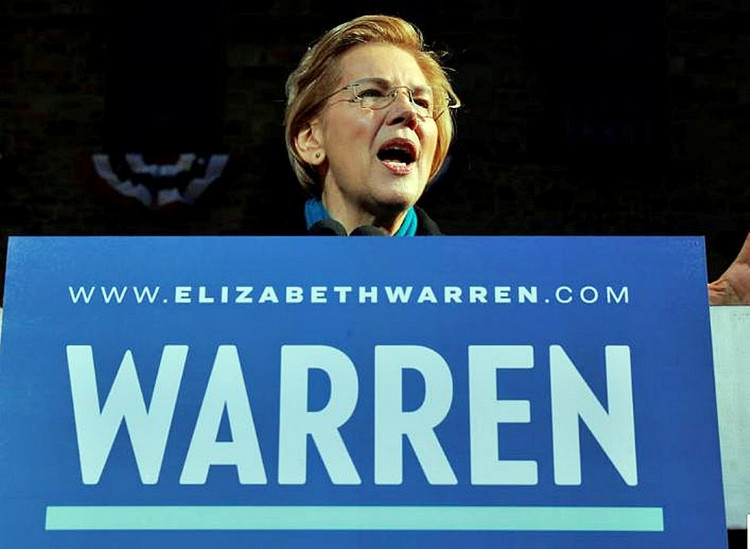"Big Tech" firms and moneyed donors in Silicon Valley are grudgingly indicating their support for the presidential candidacy of frontrunner Sen. Elizabeth Warren (D-MA) by contributing heavily to her campaign despite her pledge to break-up huge tech firms such as Facebook and Google when elected U.S. president.
Mostly liberal and supporters of the Democratic Party, leaders and employees of tech firms operating in Silicon Valley and California are among the most ardent foes of President Donald Trump and his right-wing agenda. The shared aim of denying Trump re-election in 2020 is a unifying factor bringing Warren and tech firms together.
Employees from Alphabet Inc., Google's parent firm, have donated $126,000 to Warren's campaign since she officially entered the nomination race in February, said the nonpartisan Center for Responsive Politics. Google employees have donated $32,000, according to data from the Federal Election Commission.
Analysts say these donations from rank-and-file tech valley employees are heading towards Warren because of her ability to connect with employees that believe Big Tech has become too powerful and she remains the best bet to defeat Trump in 2020.
"They see it up close and personal and are even victims of some of its (Silicon Valley's) problems," said one analyst. "Plus they're just plain progressive and can't stand Trump."
Silicon Valley execs and entrepreneurs also share the same antipathy towards Trump, while admitting the strong economy hasn't been of many benefits to employees. Warren said she plans to change that by limiting the anti-competitive power of Big Tech and holding them accountable.
"The truth is that most of the U.S. haven't participated in the financial gains of Wall St. or Silicon Valley. In that, (there) is a lot of frustration about systems led by groups of insiders," said Chamath Palihapitiya, a Silicon Valley-based venture capitalist and part-owner of the Golden State Warriors NBA basketball team, to CNBC.
"Trump was the populist right's reaction to this. Warren is the left. The difference between the two is that Warren is more disciplined, policy-focused and detail-oriented than Trump. She is Trump's greatest threat to reelection."
Palihapitiya was one among a large number of tech bigwigs that contributed money to Warren's campaign to become the Democratic Party's presidential nominee. He contributed $5,000 to Warren's campaign in the second quarter and did so again in the third, but hasn't revealed the amount.
Palihapitiya said the growing support for Warren among tech firms comes down to her being the equivalent to Trump on the progressive side of the political spectrum, but more policy-focused.
Tech firms also yearn for a return to predictability in the federal government that allows them to better plan for the future. This predictability has been absent under Trump.
"What business is looking for is a period of stability and calm," said Frank Aquila, a corporate law partner at Sullivan & Cromwell, an international law firm based in New York City.
"It's less a partisan issue and more about bringing economic conditions that allow businesses to focus on business instead of wondering about the political world every two minutes. Many CFOs have told me over the years, 'I can deal with higher tax rates or lower tax rates. I just need to know what the tax rate will be.'
Warren does have a plan to break-up Big Tech firms. She argues Big Tech has too much power and an unfair advantage over smaller competitors.
"Today's big tech companies have too much power -- too much power over our economy, our society, and our democracy," she said back in March. "They've bulldozed competition, used our private information for profit, and tilted the playing field against everyone else. That's why my administration will make big, structural changes to the tech sector to promote more competition -- including breaking up Amazon, Facebook, and Google."






